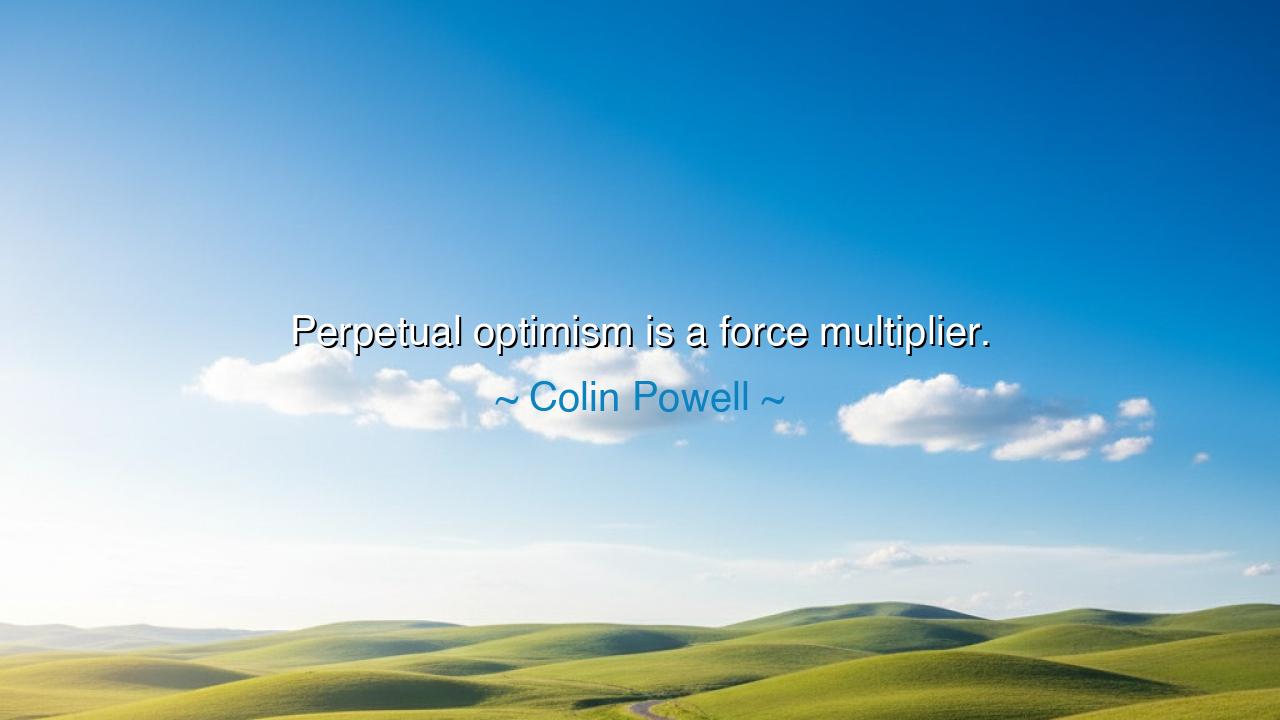
Perpetual optimism is a force multiplier.






Hear, O children of endurance and valor, the words of Colin Powell, a leader forged in the crucible of service and war: “Perpetual optimism is a force multiplier.” In this utterance lies a secret known to generals and sages alike—that the mind’s vision of hope, when held not for a moment but for all seasons, magnifies strength beyond measure. For when the spirit is lifted by optimism, it breathes new power into weary arms, awakens courage in fearful hearts, and turns small bands of men into legions of unyielding resolve.
The meaning of this teaching is clear: perpetual optimism is not blind cheer, nor foolish denial of hardship. It is the deliberate, enduring choice to see beyond the present struggle, to believe that victory can be won, and to carry that belief until it infects all who labor beside you. A leader who radiates optimism grants his people a force greater than weapons or numbers—the belief that their cause is worth the sacrifice, and that triumph lies within reach. This belief multiplies every ounce of effort, making the impossible possible.
The origin of Powell’s words rests in the battlefields and war rooms where he served as soldier, general, and statesman. He saw how despair could spread like poison, weakening entire armies. But he also witnessed how a leader’s steadfast optimism, repeated and sustained, could stiffen the spines of the weary and transform defeat into victory. His wisdom was not theory, but the lived knowledge of one who bore the weight of command and the lives of thousands upon his shoulders.
Consider the story of Winston Churchill, who in Britain’s darkest hour refused to speak the language of surrender. When bombs rained down upon London, he declared, “We shall fight on the beaches… we shall never surrender.” His perpetual optimism became the shield of his people. Though vastly outnumbered and battered, the English stood firm, their courage multiplied by the fire of his words. The optimism of one man became the power of a nation.
Think also of Hernán Cortés and his small force in the conquest of Mexico. Though vastly outnumbered, he ordered the burning of his ships, declaring there would be no retreat. To despair would have been death, but his show of unyielding optimism convinced his men to fight with a fervor that multiplied their power. Though history may debate the morality of his conquest, it cannot deny the truth Powell spoke—that optimism multiplies strength, binding men to fight beyond their limits.
O seekers of destiny, learn this: numbers and resources matter, but they are not everything. The true power of any endeavor lies in the spirit that carries it. A band of the hopeful can outlast an army of the fearful. A heart filled with optimism can endure trials that crush the bitter. Therefore, cultivate within yourself this perpetual flame, for it will carry you further than skill alone.
Practical wisdom calls you: when you face hardship, refuse to let despair shape your vision. Speak words of encouragement, even when your own heart trembles. Stand upright, even when the burden is heavy, for others will draw strength from your resilience. Make optimism a habit perpetual, not fleeting. Each day, choose to see possibilities, choose to affirm progress, choose to hold faith that your labor is not in vain. In doing so, you will not only lift yourself—you will multiply the strength of all who walk beside you.
Therefore, remember the counsel of Colin Powell: “Perpetual optimism is a force multiplier.” Let it be your guiding creed in war, in work, in life. For optimism, held steady and unbroken, magnifies effort, breeds courage, and transforms frail beginnings into mighty victories. The world belongs not to the strongest alone, but to those who keep hope alive when others fall into despair. Carry that hope always, and you shall multiply not only your own strength, but the strength of all mankind.
––






HMThanh Hoa Mai
The phrase ‘force multiplier’ really stands out. It makes me think of optimism as a kind of energy that spreads through a group, enhancing everyone’s performance. But can that same energy turn toxic if it’s forced? I’ve seen situations where teams are told to ‘stay positive’ even when things are clearly going wrong. How can optimism be authentic and sustainable without turning into denial or performative positivity?
NTChien Nguyen Trong
This quote resonates with me because it reframes optimism as strength rather than just a personality trait. It feels especially relevant in times of crisis, when morale is low. But I’m curious—does perpetual optimism come from discipline or belief? Can someone train themselves to be consistently optimistic, or is it an innate quality that only certain leaders naturally possess? That distinction feels important for understanding true leadership.
VAVan Anh
I love how this statement suggests that optimism isn’t just emotional—it’s strategic. It makes sense that people are more motivated and resilient when they believe in a positive outcome. Still, I’m curious how this idea plays out in environments with constant pressure or failure. How does a leader maintain perpetual optimism without sounding naïve or dismissive of genuine challenges their team faces?
VCVo Cuc
This quote really makes me think about the connection between attitude and results. The idea that optimism can amplify performance is powerful, especially in leadership or teamwork. But I wonder—can perpetual optimism ever become unrealistic or even dangerous? For example, in high-stakes situations, could constant positivity blind people to potential risks? I’d like to understand how to balance unwavering confidence with the need for critical thinking and caution.